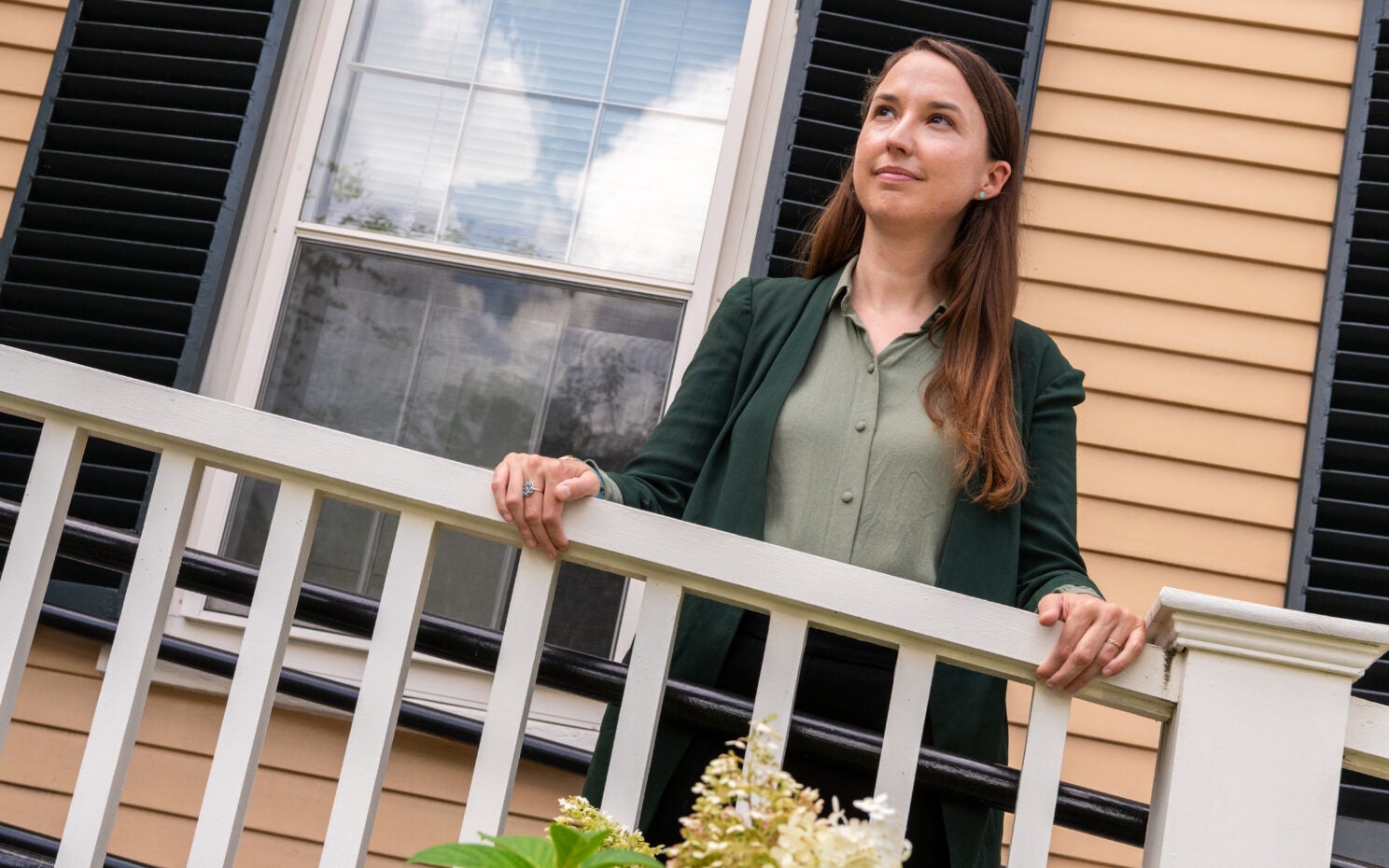A playbook for policy change
Leah Stokes turns a love for the wilderness into a commitment to help mitigate climate change
Leah Stokes turns a love for the wilderness into a commitment to help mitigate climate change

Photos by Lou Jones
Photos by Lou Jones
This story originally appeared in Radcliffe Magazine .
Leah Stokes is on a tight deadline.
While most humans continue to try to wrap their heads around the impact of global warming while doing the very things that raise temps, Stokes, the 2023–2024 Jeffrey S. and Margaret Mais Padnos Fellow and a professor of environmental politics at the University of California, Santa Barbara, knows we’re terribly behind and is doing just about everything in her human power to hurriedly catch up — and to explain what’s at risk if we don’t.
Google Stokes’s name and see: August 5, an opinion piece in the Los Angeles Times, “ The Terrible Climate Hypocrisy at the Top of Southern California Edison ”; August 14, in the Atlantic, “ I Turned My House into a Zero-Carbon Utopia ”; September 11, again in the LA Times, “ How California Schools Can Finally Quit Burning Fossil Fuels .” In 2022 alone, she conducted 150 on-air interviews.
And that doesn’t include her talks and congressional testimony. Or the calls made and e-mails sent to connect and move legislation forward. Or the book she’s writing about the importance of legislative policy in speeding things up before our collective pot starts to boil.
On December 17, 2021, when she posted a smiling pic of herself waving a mini-American flag and proudly announcing her US citizenship (she was born in Canada), Bill McKibben ’82, one of the world’s preeminent environmentalists and authors on global warming and the founder of the climate campaign group 350.org, posted a reply: “This makes me feel a little patriotic, which I haven’t felt in a while,” McKibben wrote. “How lucky are we?!”
Stokes’s grandmother immigrated from Belfast to Canada in the early 1960s and found work as a hostess in a wilderness lodge in Algonquin Provincial Park, in Ontario, located about three hours northeast of Toronto and the oldest provincial park in Canada. Her father grew up in the park, spending his summer gutting fish and going on long solo canoe trips.
He taught his three daughters, including Leah, about the land during one-on-one canoe trips into the 2,955-square-mile park’s deep glacial ecosystem, portaging from one of the park’s more than 2,400 lakes to another, catching fish for supper — journeys that still evoke a spiritual quality for Stokes.
“I don’t really know why I’m an environmentalist,” Stokes said during a recent interview. “I do have this attachment to wild spaces. Is there a way that the ecosystem itself causes you to protect it?” (She recently finished Diana Beresford-Kroeger’s “To Speak for the Trees: My Life’s Journey from Ancient Celtic Wisdom to a Healing Vision of the Forest” [Random House Canada, 2019], about communicating with trees and nature.)
When she was in school, climate change was relatively new as an area of study. At the University of Toronto, she studied psychology, got interested in behavioral change, and immediately applied her new skills to design an energy conservation campaign.
“This was the era of Gore’s “An Inconvenient Truth,” where the main thing we were supposed to do was switch our lightbulbs to compact fluorescents and then turn off our lights and sit in the dark,” Stokes said. “It’s not actually going to solve climate change, but that’s what we were up to then as a movement. It’s hilarious to look back on.”
She helped run campaigns on campus that ended up saving 12 percent energy consumption, which was a victory, but, she said, “I just had the feeling like that wasn’t enough.”
While getting her doctorate at the Massachusetts Institute of Technology (MIT), the discipline of political science was not yet focused on climate change. “It wasn’t understood,” she said. “So I was in these programs and was the weird kid in the corner bringing up this thing called climate change, which at the time was this abstract issue that will affect people two generations from now.”
It was during her dissertation at MIT that Stokes found her climate mojo. It would later become “ Short Circuiting Policy: Interest Groups and the Battle over Clean Energy and Climate Policy in the American States ” (Oxford University Press, 2020), in which she interviewed more than 100 people who spent their time trying to pass renewable energy portfolio standards and chronicled the battles that ensued when energy companies and other special interests to roll them back.
“Although I didn’t know it at the time, I learned how policy change works, how powerful the lever of policy is in creating huge change,” she said. “And through that process, I felt not just empowered — I felt I was absorbing almost through osmosis a playbook for how I could change policy.”
Then a triumph: the Build Back Better Act passed the House in the fall of 2021 and included $555 billion in clean energy and climate investments. It was what Stokes had dreamed of, and she was helping write it.
It was an intense time. While she had written about people’s experiences trying to pass such policies and the money and power that is spent to circumvent them, now she was at ground zero and able to influence where this historic moment could go.
“I felt this moral imperative to dedicate my life to this problem — it’s almost like your brain gets infected, and there’s a certain way of seeing the world that you just can’t unsee.”
“I felt this moral imperative to dedicate my life to this problem — it’s almost like your brain gets infected, and there’s a certain way of seeing the world that you just can’t unsee.”
“I felt this moral imperative to dedicate my life to this problem — it’s almost like your brain gets infected, and there’s a certain way of seeing the world that you just can’t unsee,” said Stokes. “If you really love the planet, if you love its diversity and all the beings in it, even the bugs, then you know the loss of that is not something that can ever be replaced. It will never be the same. And when a thing is gone — this is the shifting baselines idea — people forget that it was ever there. But I don’t want that. We already have less.”
But a setback soon followed. For more than a year before July 2022, congressional Democrats and President Biden worked to negotiate a huge climate policy package that would be a complete game changer after four decades of attempts and failures. Forty-nine senators were in agreement. And then at the last minute, coal-backed West Virginia Democrat Joe Manchin walked away and torched the deal.
Stokes and her colleagues were devastated. But rather than pout, Stokes wrote an opinion piece and sent it to the New York Times. “ What Joe Manchin Cost Us ” was published July 16, 2022. In it, she wrote:
“A few days ago, I was watering my garden in Southern California when a hummingbird approached,” she wrote. “It flew within inches of my hand and seemed delighted when I sprayed its iridescent feathers. The West is in the midst of yet another climate disaster —the worst drought in over a millennium — and the bird needed water. In its own way, this tiny creature was telling me that our hotter planet is less safe than it used to be.
“Hold your children close tonight. Leave some water out for the birds. And make a plan to call your elected leaders to demand climate action, to rip out your fossil fuel furnace or to buy an e-bike. The climate crisis is getting worse, and Congress is one vote short of saving us. We’re going to have to save ourselves.”
Manchin later changed his mind, and the bill passed, leading to the landmark Inflation Reduction Act.

At Radcliffe, she rides around on her own e-bike and is not using the gas stove in her Cambridge rental. The other day, she spent part of the day reading poetry. “I feel a little less urgency here now,” she said, “which is not something I often feel. It’s always a burning building: everything matters, every heat pump matters.”
While the fire remains strong to continue confronting climate change, Stokes is using her time in Cambridge to recharge, plan ahead, and play a little bit with her twin daughters, who, like their mom, are getting to know the woods and lakes and value of places like Algonquin.
“There’s a depth to the time with your children,” she said. “There’s something to be said for singing and dancing and playing and drawing and all the things kids want to do. And in the end, it just deepens the work and gives me motivation too.”
